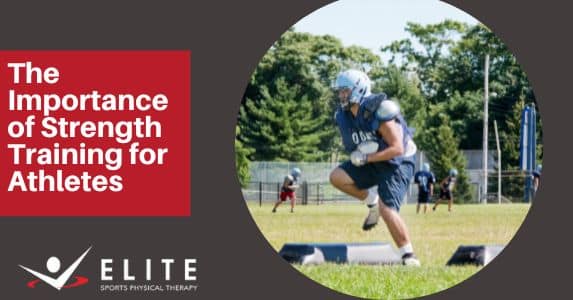Strength training is an essential part of any athlete’s training regimen. It helps to improve muscle strength, power, and endurance, which can all contribute to improved athletic performance.
However, equally important to an athlete’s performance is keeping them in the game and safe from injury. A recent study published in 2023 showed over 5 million sports injuries during a 4 year period for high school students. Sprains and strains were the most common, making up 37% of the total injuries. Most of these resulted in a minimum of missed time away from the sport and led to discontinuation of the sport in some cases, but the study emphasized the importance of preventative strategies to reduce the chance for injuries.
Strength training helps prevent injuries by building the muscles and joints that are most vulnerable to injury. It’s often recommended following sports physical therapy to improve muscle strength and can also improve a patient’s overall metabolism and health.
How Strength Training Works
When you strength train, you are essentially breaking down your muscle fibers. As your body repairs these fibers, they become stronger and more resistant to further damage. This process is known as muscle hypertrophy.
Strength training also helps to improve your body’s ability to produce force. This is important for athletes because it allows them to generate more power, which can be helpful in a variety of sports.
The Benefits of Strength Training for Athletes
There are many benefits of strength training for athletes, including:
- Improved athletic performance. Strength training can help athletes to improve their speed, power, and jumping ability. This can be a significant advantage in many sports.
- Reduced risk of injury. Strength training can help to strengthen the muscles and joints that are most vulnerable to injury. This can help to prevent injuries such as ACL tears, hamstring strains, and ankle sprains.
- Increased bone density. Strength training can help to increase bone density, which can help to prevent osteoporosis.
- Improved balance and coordination. Strength training can help to improve balance and coordination, which can be helpful in many sports.
- Reduced body fat. Strength training can help to reduce body fat, which can improve athletic performance and overall health.
- Improved mental toughness. Strength training can help to improve mental toughness, which can be helpful in dealing with the stress of competition.
How to Strength Train for Athletes
The best way to strength train for athletes will vary depending on their sport and their individual goals. However, some general principles of strength training for athletes include:
- Use a variety of exercises. It is important to use a variety of exercises to work all of the major muscle groups. This will help to ensure that you are getting a well-rounded workout.
- Lift weights that are challenging but not too heavy. You should be able to lift the weight for the desired number of repetitions with good form. If the weight is too heavy, you will be more likely to injure yourself.
- Focus on proper form. Proper form is essential to avoid injuries. Make sure that you are using the correct technique for each exercise.
- Gradually increase the weight and/or number of repetitions over time. As you get stronger, you will need to increase the weight or the number of repetitions in order to continue making progress.
- Warm up before you start strength training. Warming up will help to prepare your body for exercise and reduce your risk of injury.
- Cool down afterwards. Cooling down will help your body to recover from exercise and prevent muscle soreness.
Strength training is an important part of any athlete’s training regimen. By following the tips in this blog post, you can safely and effectively improve your strength, power, and endurance, which will help you to reach your full potential and avoid injuries.
If you have questions about strength training as part of your recovery from a sports injury or to prevent further injury, ask your physical therapist. If you are in the Waco or Clinton, Texas area, give us a call at Elite Sports Physical Therapy.
Additional Resources
- The National Strength and Conditioning Association: https://www.nsca.com/
- The American College of Sports Medicine: https://www.acsm.org/
- The National Athletic Trainers’ Association: https://www.nata.org/

